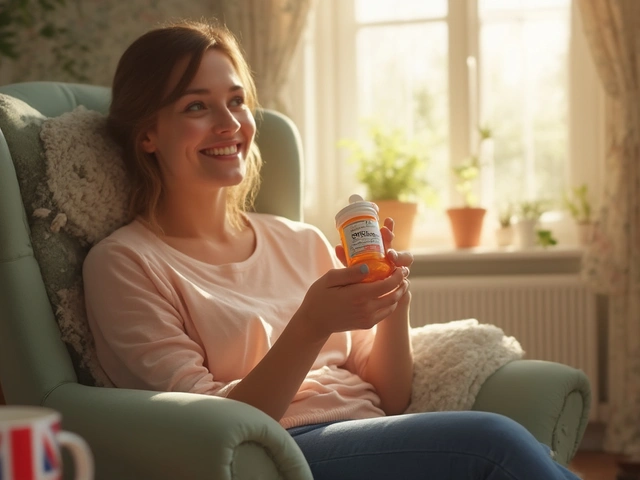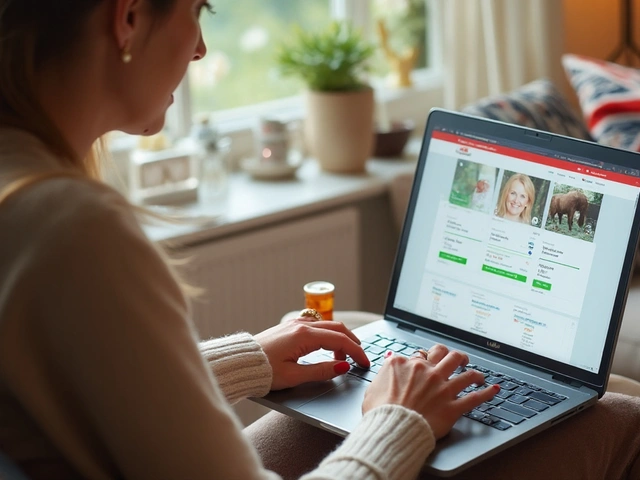Anxiety doesn’t wait for permission. When you’re backstage with sweaty palms, about to step into the spotlight, words like "breathe" or "relax" usually go in one ear and out the other. It's no wonder so many people turn to propranolol—a beta-blocker famous for muting the physical signs of anxiety. But maybe you're not keen on taking a prescription med for your nerves, or you want to see if there’s another way to calm the storm inside your head. Well, you’re not alone. In fact, searches for a natural alternative to propranolol have shot up as more people look for solutions that won't leave them feeling foggy or drained. Let’s break down the best non-pharmaceutical options—ones that actually make an impact when the pressure’s on.
L-Theanine: The Calm Within Your Cup
Ever wonder why a warm cup of green tea feels so soothing? Credit goes mostly to L-theanine, a natural amino acid found in tea leaves. L-theanine’s superpower is its ability to boost alpha brain waves—the same ones cranked up during meditation or daydreaming. That’s the wave you want when you’re about to present in front of an audience or walk into a high-stakes meeting. Alpha waves promote creative thinking and relaxation, but won’t put you to sleep. It’s calm focus, not sedation. A 2019 study published in Nutrients found that 200mg of L-theanine improved focus and reduced stress in healthy adults facing challenging tasks. Participants felt less anxious before a test and didn’t report drowsiness or a "hangover" quality you sometimes get from meds.
One cool fact: L-theanine may help balance neurotransmitters like dopamine and serotonin. Those are your brain’s mood lifters and calmers. Taking L-theanine as a supplement is simple—most people start with 100-200mg, about what you’d find in 8-10 cups of strong green tea (but no one has time to drink that much tea before a performance). Capsules do the trick and usually kick in within an hour. It often plays nicely with caffeine, too. Some performers swear by a combo: a regular cup of coffee plus 200mg L-theanine for smooth alertness—no jitters. Side effects are rare, but check with your doctor if you’re stacking supplements or on prescription meds.
Where it works best: stage fright, presentations, interviews, first dates—basically, anytime your heart’s in your throat but you need to stay sharp and not sluggish. Unlike beta blockers, it doesn’t block adrenaline at the source. Instead, L-theanine helps your brain ride out that adrenaline spike without feeling like you’re fizzing with panic. It’s subtle, but for many, it’s powerful enough to keep their cool when it counts.
Mindfulness: Training the Mind, Taming the Nerves
Picture this: You’re about to perform. Suddenly, you notice your heart racing and your hands clammy. Training yourself to respond differently—to actually notice the nerves and ride them out, without letting them spiral—is the core idea behind mindfulness. Mindfulness isn’t about squashing nervousness. It’s about acknowledging it, stepping back, and not letting it hijack your performance. No fancy equipment needed—just your own two feet, a bit of patience, and a willingness to sit with discomfort rather than bulldozing it away.
A randomized, controlled trial in 2019 (Journal of Anxiety, Stress, & Coping) asked college students with high social anxiety to practice mindfulness for six weeks. Even just ten minutes a day of guided mindfulness (think: noticing your breath, your body, and not judging what you feel) significantly dialed back their anxiety levels before presentations. Practicing mindfulness rewires patterns in your brain’s default mode network, making you less likely to spiral into “what-if” thinking just before you need to focus. MRIs have even shown their amygdala—the fear center—shrinks a bit over time.
For performance anxiety, a simple trick: try a “body scan” before you go on. Close your eyes, scan your body for tension from head to toes, and accept whatever you feel—light, heavy, tight, buzzy—without trying to change it. It can yank your mind away from “what if I mess up?” and bring you back to the moment. Pair mindfulness with deep breathing (more on that next), and it’s like giving your brain training wheels for high-pressure moments. Apps like Headspace or Calm have specific tracks for performance anxiety if you want guided help. With regular practice, people report fewer racing thoughts, less sweating, and an easier time recovering from slip-ups on stage. You won’t forget your lines—or your point on the slides—when your brain is dialed in, not panicking about imaginary disasters.

Breathing Techniques: Your Built-In Performance Hack
Think breathing is just something you do on autopilot? Not when you’re anxious. When nerves hit, people breathe fast and shallow—chest tightens, shoulders go up, adrenaline surges. Learning to control your breath is the fastest tool to signal your body that you’re not in danger. It’s instant, always available, zero cost. Researchers at Stanford University found that just five minutes of slow, controlled breathing (six breaths per minute) right before anxiety-inducing tasks significantly dropped heart rate and self-rated anxiety.
The go-to routine is “box breathing,” used by Navy SEALs and public speakers alike. Here’s how you do it:
- Inhale through your nose for four seconds
- Hold the breath for four seconds
- Exhale slowly through your mouth for four seconds
- Hold again for four seconds
Repeat for three to five minutes. This simple method activates your parasympathetic nervous system, which acts like your mind’s calm-down button. Breath focus redirects the brain away from spinning in anxiety and toward a sense of steadiness. Another option is “4-7-8 breathing” (inhale for 4 seconds, hold for 7, exhale for 8)—it’s slower and especially good when you need to take the edge off in a hurry. Before you head on stage, find a corner, set a timer for five minutes, and let those nerves settle as you pace your breathing. Athletes use this, musicians swear by it, and even CEOs claim it helps them stay level during big pitches.
If you want to geek out on the science, controlled breathing sends a signal to your vagus nerve—slowing your heart, lowering cortisol, and flipping your nervous system from fight-or-flight to rest-and-digest. One more tip: combine breathing exercises with power poses (standing tall, opening your chest) to boost confidence even further.
Comparing Natural Alternatives and Propranolol
Let’s get practical for a moment—how do these natural choices stack up against a prescription pill like propranolol? People reach for propranolol when they want physical symptoms of anxiety—mainly shaking, sweating, a pounding heart—gone fast. But while it’s effective, it can also blunt your emotions, leave you feeling a little flat, and isn’t great if you have conditions like asthma or low blood pressure. Natural options like L-theanine, mindfulness, and controlled breathing focus more on your mind’s response to stress, rather than flipping a chemical switch in your body.
Here’s a quick overview to compare:
| Remedy | How it Works | When to Use | Side Effects |
|---|---|---|---|
| Propranolol | Blocks adrenaline, slows heart rate | Acute physical symptoms before performances | Fatigue, dizziness, not for asthma |
| L-theanine | Boosts alpha waves, relaxes brain | Nerves with need for focus/alertness | Rare, usually none reported |
| Mindfulness | Retrains thought patterns, reduces avoidance | Chronic or repeated performance anxiety | None |
| Breathing techniques | Activates vagus nerve, lowers heart rate/cortisol | Right before stressful tasks | None |
What stands out? The natural approaches often complement each other. You can take L-theanine before an event, use mindful focus during, and control your breathing whenever panic hits. These options aren’t just "softer"—people who stick to them often find the effects last longer into future performances. You’re not just covering symptoms; you’re actually building resilience over time. Need more evidence and options? Check out reviews and details on other natural alternative to propranolol choices here.

Smart Tips for Making the Switch
Thinking about dropping propranolol, or want to try natural methods first before a prescription? Here’s what makes sense:
- Test-run natural remedies before a real performance. Try L-theanine at home, practice mindfulness during stress-free moments, and rehearse breathing techniques before bed until they become habits.
- Keep a diary noting when nerves hit you hardest. Some people get the shakes only with public speaking, others when they’re being interviewed or recorded. Tune your plan to your triggers.
- Give mindfulness a real shot—set reminders, use an app, or join a local group. You need regular reps before you feel the payoff. Consider ten minutes a day for two weeks, then see what changes.
- If using L-theanine, buy from a reputable supplement brand. Watch out for mystery blends with weird additives.
- If you’re currently on propranolol or any beta blocker, talk to your doctor before stopping. Lots of folks safely combine low-dose beta-blockers with natural methods during the transition.
- Remember, the real magic is in repetition. Losing your nerves once is nice; building the skill to stay cool again and again—that’s freedom.
Nerves might never fully disappear. But with these natural tactics, you can stop them from running the show. L-theanine, mindfulness, and controlled breathing have actual science (and plenty of real-world proof behind them) for beating back the pre-performance jitters. It's about staying steady, showing up as yourself, and knowing you’re in control—even when the lights are brightest.






Post A Comment